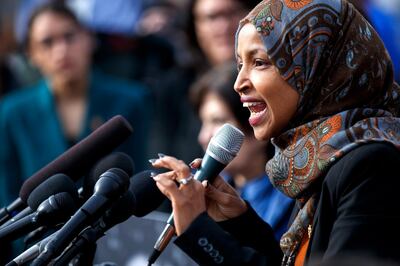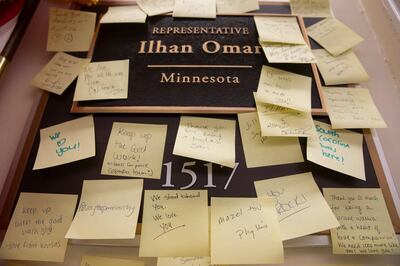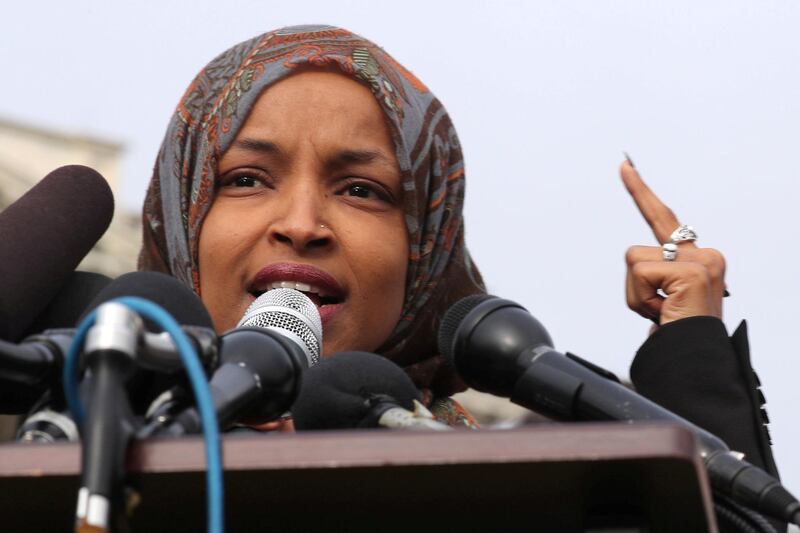The American political mainstream is finally emerging from decades of unnatural and enforced silence on unconditional US support for Israel. But as this week's showdown over congresswoman Ilhan Omar's comments demonstrated, a healthy alternative debate has yet to emerge.
Several new Democratic lawmakers are pushing the envelope on criticism of Israel by elected American officials. But in several cases, they appear to be out of their depth.
Minnesota's Ms Omar and Rashida Tlaib of Michigan are the first Muslim American women in Congress and ardent liberals. As such, they are likely to be scrutinised more than other politicians, which heightens the significance of their words and deeds. Regardless of how fair that is, they are representative of communities that have been largely missing from mainstream politics. That is why it is so unfortunate that in her zeal to make her mark, Ms Omar has already stumbled on several issues, including Israel.
In a Twitter conversation about why American politicians support Israel to the extent of backing unconstitutional, unenforceable laws suppressing freedom of speech and the right to activism, Ms Omar wrote: "It's all about the Benjamins, baby". She was apparently quoting a line from a 1997 Puff Daddy song, in which "Benjamins" refers to $100 bills, as they bear a portrait of Benjamin Franklin, but the tweet was interpreted as perpetuating stereotypes about undue Jewish influence. Pressed on who she believed was allegedly paying American politicians to support Israel, she replied emphatically: "Aipac!", referencing the acronym for the American Israel Public Affairs Committee, an umbrella Jewish-American organisation. She has since apologised "unequivocally" for her tweets and said: "The thing that has been hurtful about this whole process for me is knowing that I could be someone who could use language that causes hurt to others," but the damage has been done.

Her comments were a huge misstep on multiple levels. First, while no one doubts the significance of money in US politics, shallow statements about “Jewish cash” will invariably come across as anti-Semitic because of the obsession by bigots about the supposedly pernicious social and political influence of allegedly nefarious Jewish wealth.
That pernicious narrative has been at the heart of modern, western anti-Semitism and fuelled the hatred that prompted the holocaust. Any serious discussion about Jewish political participation in the US, especially where financial clout and media influence are concerned, must be conducted thoughtfully and sensitively as a result.
Ms Omar's glib remarks demonstrated little understanding of the complexities of American support for Israel, let alone the highly charged, emotive issues driven by the history of anti-Semitic rhetoric.
Her comments neither advance an intelligent, rational consideration of US policy, nor do they help the Palestinian cause. But they do, unfortunately, reinforce the false stereotype that Muslims are anti-Semitic.
American politics are slowly awakening from an extended slumber, during which rational conversation about any policy concerning Israel has been practically impossible. A remarkable generational shift, especially on the left and including Jewish Americans, means younger Americans from all backgrounds no longer see Israel as being beyond criticism. That is extremely healthy but comes with considerable pitfalls.
An important lesson is how the UK's Labour Party has tied itself in knots by desperately trying to disentangle legitimate criticism of Israel from a strain of left-wing anti-Semitism. Labour leader Jeremy Corbyn has said on a number of occasions that he “will not tolerate anti-Semitism in any form” but has been accused of close ties to a number of militant groups and in 2013 accused British Zionists of having no sense of irony. Meanwhile two Labour MPs called on him earlier this month to “adequately tackle cases of anti-Semitism” and said there was a danger of the party appearing to be "institutionally anti-Semitic". Last week a no-confidence motion in Jewish MP Luciana Berger was hastily withdrawn as Labour admitted it had received 673 complaints about anti-Semitism from its members in 10 months.
These developments on both sides of the Atlantic demonstrate how imperative it is to remain neutral and fair-minded in evaluating Israeli policies and western support, criticism and discourse about them. Neither a blind pro-Israeli dogma nor thoughtless hostility or cynicism will advance the conversation.

If this generational transformation in attitudes is to improve US discourse and policy and benefit Palestinians, it has to be fact-based, historically informed and rigorously fair to all parties.
More importantly, Ms Omar's statements are mainly problematic because they are factually, and not politically, incorrect. The idea that US support for Israel is primarily based on campaign contributions or other financial inducements badly misreads the US political and cultural landscape.
No good – and certainly, no good response – can come of such errors.
Numerous factors contribute to the powerful attachment many Americans have to Israel.
It is, of course, significant that there is a great deal of pro-Israel money and media power at play in US politics. On the flip side, there is almost no money or media sway on the Palestinian side.
Still, this is hardly "all about the Benjamins”. The biggest single driving force in the US’s policy in dealing with Israel is religion – but it's not Judaism, it's Christianity.
In promoting US support for Israel's occupation, settlements and other aggressive policies, right-wing evangelical Christian groups are far more significant than Jewish ones.
Donald Trump was primarily pandering to these extremist Christian groups, not Jewish Americans, by recognising Israel’s claim to Jerusalem last year.
Unfortunately, a lot of supposedly pro-Palestinian rhetoric could be better described as anti-Israel. The only effective strategy would be to add a Palestinian-orientated narrative to the debate, rather than trying to negate pro-Israeli viewpoints.
The emergence of new mainstream criticisms of Israel proves that point, as decades of lobbying to stigmatise and exclude pro-Palestinian views is collapsing. In the long run, such negation never works, which is why the new anti-BDS laws are a waste of time.
But to be effective, Ms Omar and her allies need a more sophisticated understanding of how and why so many Americans passionately support Israel, the details and nature of US foreign policy in the Middle East, and how to successfully advocate a genuinely pro-Palestinian – as opposed to anti-Israeli – agenda.
Conditions are ripe for just such an initiative. But the last thing Palestinians need are facile, glib comments that play into the hands of those who would cast any criticism of Israel and its influence on US policy as anti-Semitic.
Hussein Ibish is a senior resident scholar at the Arab Gulf States Institute in Washington






